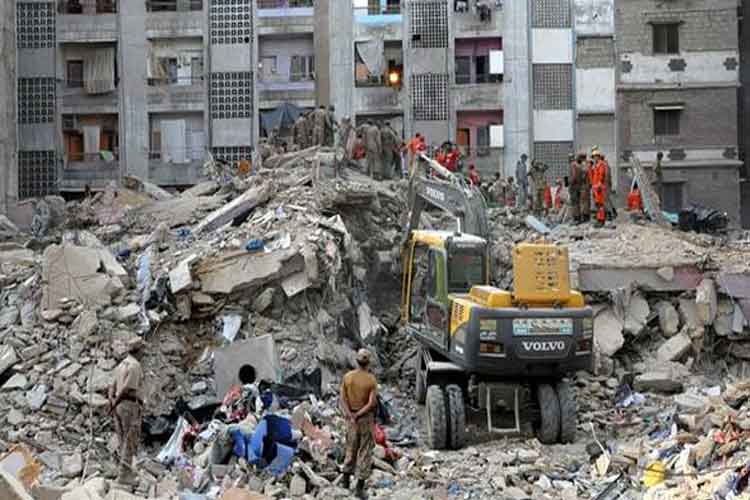When the historic Chora Church in Istanbul was being converted into a mosque by the Turkish government, Pakistan was also on course to demolish an ancient Hanuman temple in Lyari, Karachi. Not only this, Pakistan also demolished the houses of about 20 Hindu families living near the Hanuman temple. After protests by Hindus of the area gathered around the rubble of the ancient temple, the police investigated and sealed the area. As reported by Pakistani newspaper The Express Tribune, Lyari’s Assistant Commissioner Abdul Karim Memon has ordered an inquiry against the builder who demolished the temple.
Locals say that the builder had allegedly bought land around the temple and wanted to build a residential complex there. Though he promised the Hindus that he would not let the temple demolish, he also demolished the houses of the Hindus along with the temple amid the lockdown caused by the coronavirus. Mohammad Irshad Baloch, a local resident, told The Express Tribune, “It is unjust, they demolished the place of worship. It was an old temple. We have been seeing it since we were children.”
Pakistan is destroying Hindu heritage one after the other. At the same time, a small minority of the country is sitting silent due to fear of forceful conversion and abduction of women. The number of Hindus in Pakistan is decreasing with each passing year. Ever since the partition of India in 1947, Pakistan has made a lot of efforts to destroy thousands of years of rich Hindu, Jain and Buddhist history, which have preceded the roots of Islam in the region. Aaron Khalid wrote of this horrors, “How Pakistan is bound to deny the Hindu past of archeology in the country”. Even the evidence in the form of archeology is being forcibly converted to Islam.
The governments of the country have always been reluctant to accept the non-Islamic heritage of the nation. At the same time, many Hindu sculptures and artifacts were discovered during the resumption of excavation which was stopped years ago near the 1,500-year-old Panchmukhi Hanuman temple in Karachi. The search for a Muslim identity or Islamic civilization in the Pure Land is similar to the discovery of a holy cup. It is unfortunate that the past of the land, be it in culture or language or from the perspective of history, it always takes a U-turn and brings them back to their ancient roots, the roots which are associated with Hindu civilization, Which are continuing with the legacy of temples built 1,500 years ago.
The culture of minorities in the country and the disappointment of accepting their symbols took the form of revenge. This hatred has spread throughout the country. It is not limited to a handful of areas or people. Hate and poison against minorities, especially Hindus, has spread in the society. Hundreds of temples in Pakistan that were built after partition of India suddenly disappeared without noise and many were converted into shops, mosques and other buildings. Efforts to erase the past have been vocal here.
The demolition and conversion of minority places of worship in Pakistan is nothing new. Every month a new controversy comes up, either to demolish a temple, or to convert it into a mosque. While in June, Pakistani Prime Minister Imran Khan had allocated funds for the construction of a Krishna temple in Islamabad to validate his secular views, but the temple’s built walls were broken in a few days.
However, on the other hand there are some notable examples where Pakistanis have been seen trying to document their heritage. A few years ago Reema Abbasi, a journalist and writer from Karachi, published a book based on rigorous research, ‘Historic Temples in Pakistan: A Call to Conciences’, which also had many beautiful photographs of temples in Pakistan. At the same time, the Pak government also took surprising steps and took decisions recognizing temples and minorities as well. A decision was also made by the Imran Khan government to open a historic Hindu temple in Sialkot for worship after 72 years, which earned him a lot of praise. However, such examples are very rare. In a country where the number of temples used to be more than 400, in the last 70 years their number has reduced to less than a dozen.

